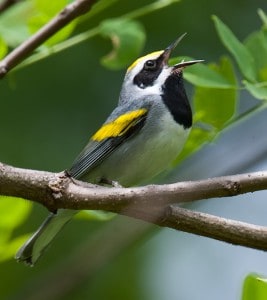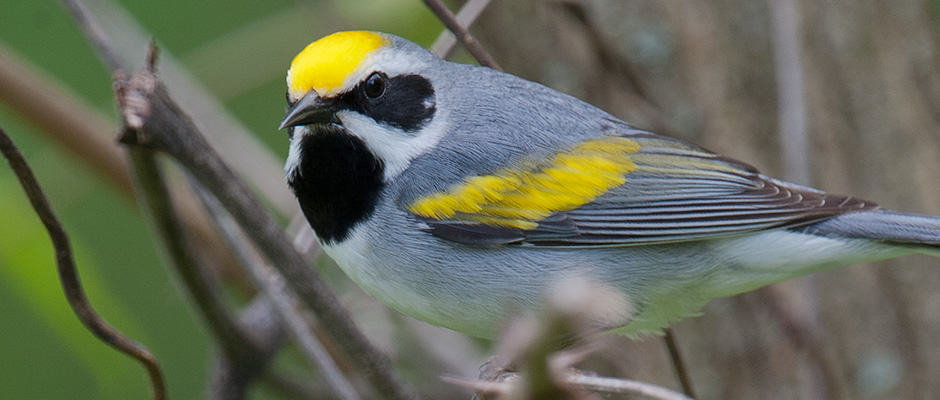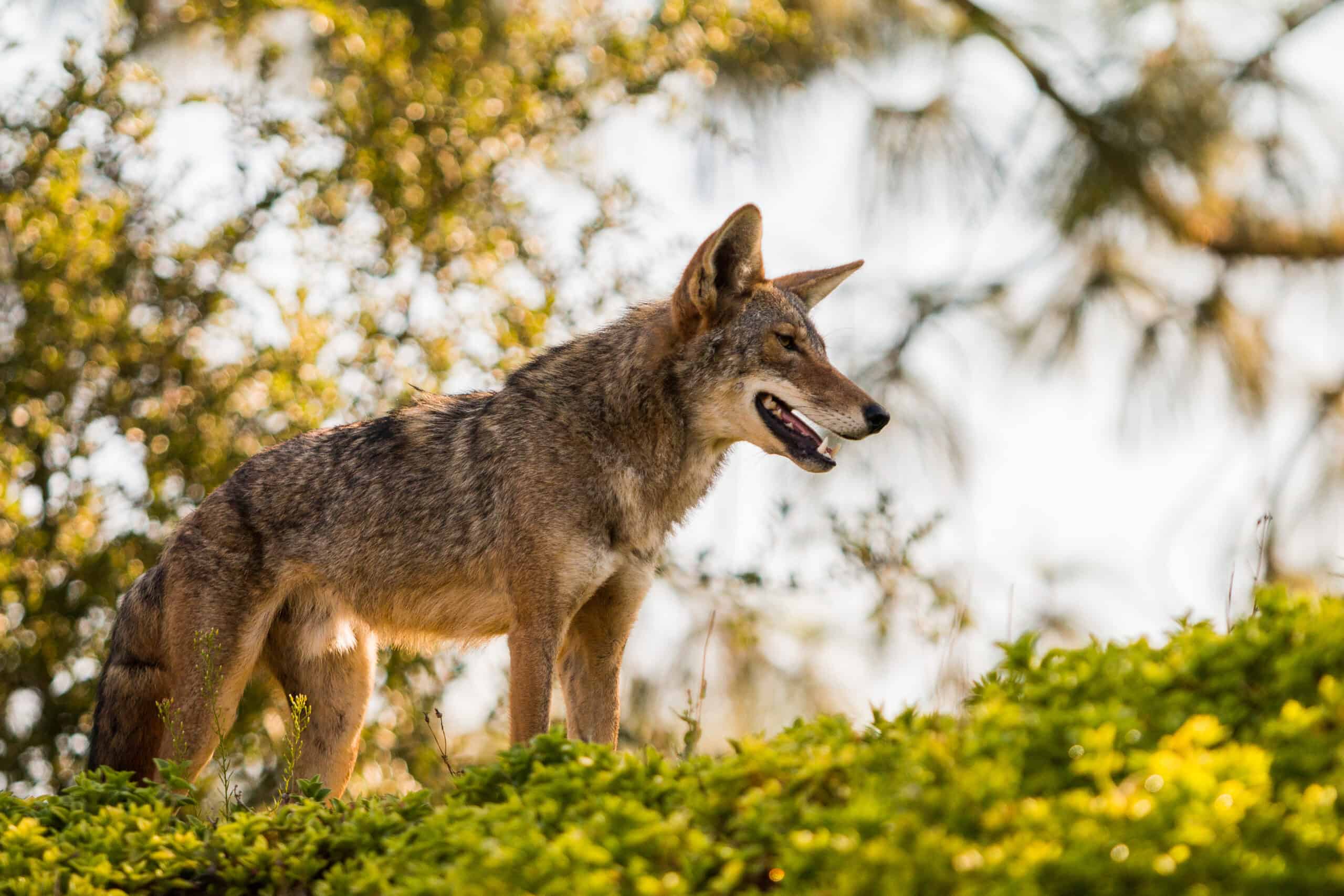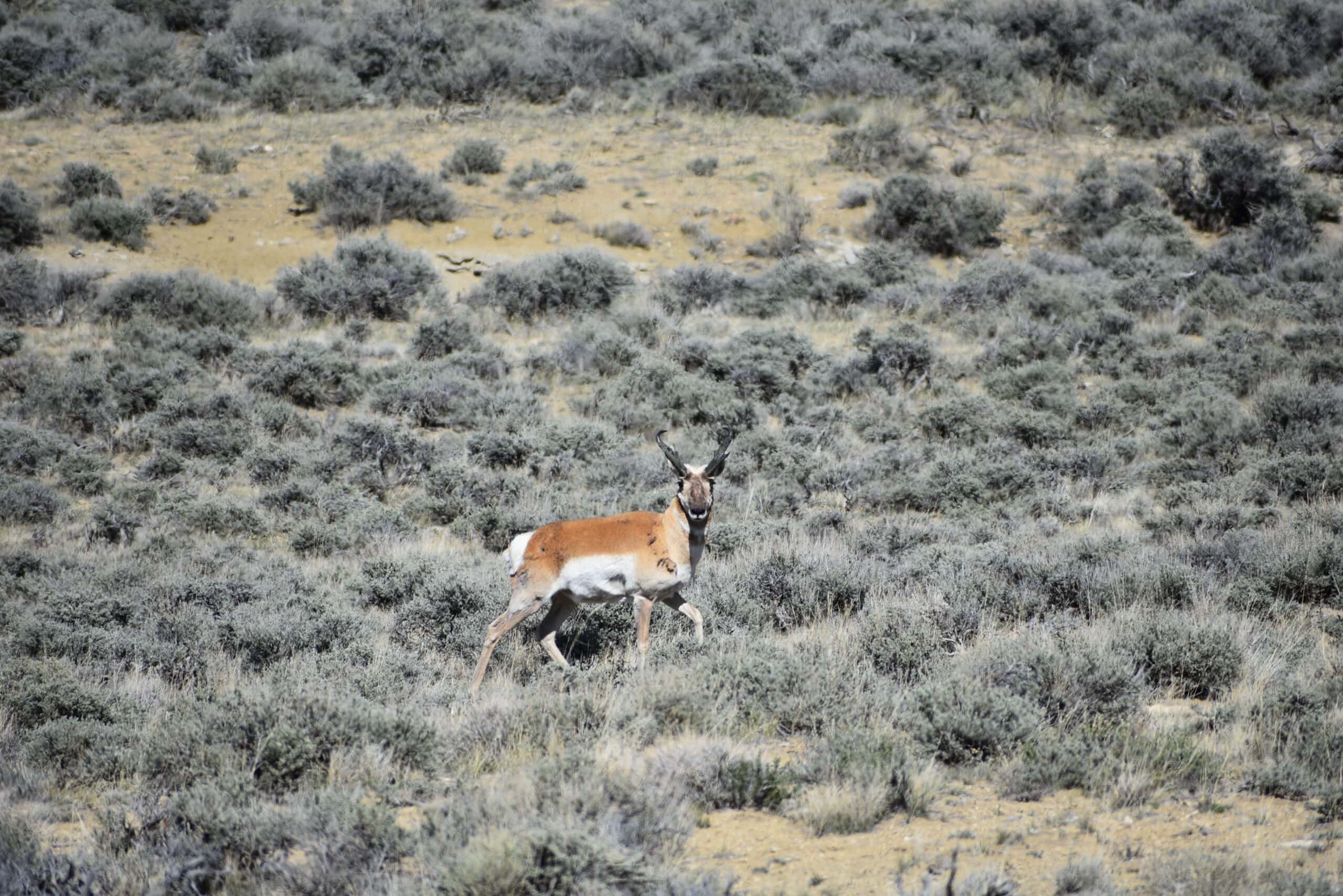Share this article
The Call of the Last Golden-Winged Warbler in Georgia
It had been over two years since the last golden-winged warbler was seen in Georgia, but Nathan Klaus and Jim Wentworth hadn’t given up hope when they set out to do their yearly transect survey around Brawley Mountain.
Populations of the colorful migratory songbird, listed as endangered in Georgia, had been declining for decades partly due to the changing landscape from open oak savanna to closed-canopy hardwood forests.

Golden-winged warblers have declined in Georgia largely due to the disappearance of the savanna habitat they favor.
Image Credit: David Cree
“Our understanding is that the southern Appalachians were far from being a closed-canopy forest prior to the 1900s,” said Klaus, a senior wildlife biologist with the nongame conservation section of the Georgia Department of Natural Resources (DNR). According to Klaus, the species found in the area were different back then and included spotted skunks, for example, that aren’t as common today.
“We believe golden wings were part of that picture, too,” he said. “Golden wings are one of the best species out there to tell us what the southern Appalachians used to look like.”
But as these oak savanna habitats disappeared in favor of hardwood pines, activities such as clear-cutting along with fire and natural disasters appeared to sustain golden-winged warblers (Vermivora chrysoptera). In fact, in the 1970s and ‘80s, the birds actually benefited from the space created by clear-cuts. Although the policy ended in the mid-1990s due to public opposition and pressure from nonprofit groups, the bird received some reprieve from Hurricane Opal that struck Georgia in 1995 and flattened swaths of the state’s thick forest. This, and prescribed burning in areas that the U.S. Forest Service had started conducting more than a decade earlier to manage the hardwood forests, cleared up space for the birds that nest in low bushes and forage in grassy areas.
After the hurricane, there were about 30 to 40 breeding pairs in five occupied sites in the state. This fledgling population declined in the 2000s as the USFS, the agency responsible for managing many of the higher altitude woodlands in the southern Appalachians, struggled to reach a consensus with conservation groups about the scale and location of forest clearing to restore suitable habitat for warblers and other species, according to Wentworth, a USFS biologist in the Chattahoochee-Oconee National Forest.
“It was like watching a car wreck in slow motion and not being able to do anything about it,” Klaus said. He, Wentworth and others continued to conduct yearly surveys while watching numbers of the bird drop steadily until there were only a few left in one of the five occupied sites — Brawley Mountain. Meanwhile, the Georgia DNR and USFS finally reached a consensus with conservation groups, but it took more time to find timber contractors to come in and conduct select logging in prescribed areas. “After about 12 years of fighting we were finally able to get a project off the ground.”
By 2013 it seemed it may have been too late, though, as the annual bird survey only turned up a single breeding male. Last year, researchers didn’t find a single golden warbler, and thought the population had been extirpated from the state.
The problems that golden-winged warblers face in Georgia are aspects of larger regional challenges affecting the migratory birds. Recently, researchers connected a much-studied golden-winged warbler from the Great Lakes region of the U.S. all the way down to Nicaragua. Amber Roth, the research assistant professor at Michigan Technological University researcher who found the banded bird, said that golden-winged warblers from many parts of the U.S. could be suffering from climate change-induced problems while crossing the Gulf of Mexico on their southward journey as well.
“Their whole population is tanking,” Klaus said of the birds, with the possible exception of populations around the Great Lakes.
On May 22, Klaus, Wentworth and staff from conservation group Georgia ForestWatch set out on their yearly survey regardless of the fact they hadn’t heard a golden-wing last year. They conduct the surveys in search of a number of bird species, and since restoring more open savanna-type ecosystems they have witnessed population increases in other species including red-headed woodpeckers (Melanerpes erythrocephalus). Klaus drove up the long bouncy gravel road in a Ford pickup truck around dawn when birds are most active. He stopped the car and he and ForestWatch representative stepped out of the truck to be immediately greeted with the buzzy, high-pitched call of a golden-winged warbler.
“For how pretty they are they don’t have a nice call,” Klaus said. “It was obvious to us.”
They didn’t spot it right away as it was around 40 feet up in a tulip poplar (Liriodendron tulipifera) and spent the next 10 minutes trying to confirm it wasn’t a blue-winged warbler (Vermivora cyanoptera) hybrid. But with binoculars, they finally caught a glimpse through some branches and the golden crown gave it away. “They are such a beautiful bird. They really are striking.”
A few minutes later, Klaus sent Wentworth a text: “Golden winged warbler on Brawley!!!!” He was excited, but it wasn’t until they conducted their survey that they could come back and appreciate another moment with what’s possibly the last golden-winged warbler in Georgia. They sat around for around 45 minutes listening to the bird call before leaving.
“We were working hard to improve some habitat for them,” Wentworth said — an effort that includes working with the USFS to bring fire back to the Appalachians “The habitat that we were creating was just coming online but wasn’t optimal yet.”
While finding one warbler certainly doesn’t equate to a viable population, it remains to be seen whether this warbler was just missed by last year’s survey or whether it’s the first one to come back after complete extirpation. Wentworth said the sighting gives them “some degree of encouragement that they’re hanging on there.”
Or in Klaus’ words, “The good news is there is a bird still in Georgia.”
Header Image:
Golden-winged warblers have suffered declines in much of the U.S. Researchers were recently worried they had been extirpated from Georgia but recently sighted a male on Brawley Mountain.
Image Credit: David Cree








